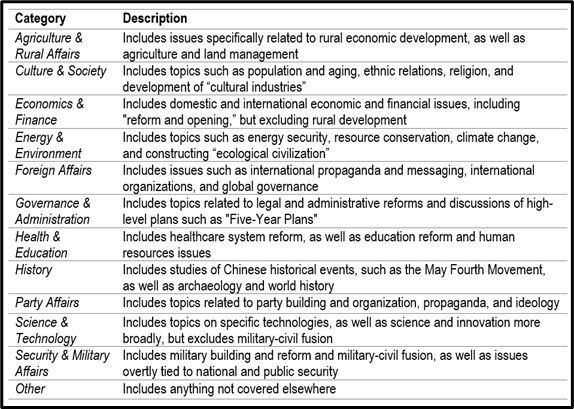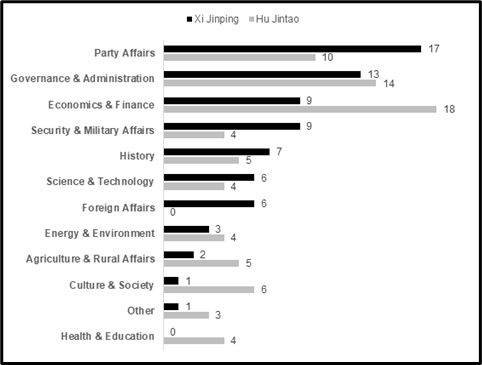Brian Hart
Introduction
On June 25, the 19th Central Committee Politburo of the Chinese Communist Party (CCP) held its 31st “group study” (集体学习, jiti xuexi) session on the topic of “Making Good Use of Red Resources and Continuing Red Blood” (用好红色资源、赓续红色血脉, yong hao hongse ziyuan, gengxu hongse xuemai). The meeting—held in the runup to celebrations of the CCP’s centenary—saw General Secretary Xi Jinping (习近平) lead Politburo members on a special visit to Peking University (北京大学, Beijing Daxue) and Fengzeyuan (丰泽园), the former residence of Mao Zedong (毛泽东), to discuss party history (Xinhua, June 26).
Observers of Chinese politics have long paid attention to Politburo group study sessions, as the meetings provide unique insights into the interests and priorities of the CCP’s elite. When analyzed across time, they offer a useful body of evidence for identifying significant changes in the party leadership’s priorities. A close analysis of study sessions reveals that, under Xi Jinping, the Politburo has more heavily focused on party affairs, foreign affairs, and security and military affairs. This represents a dramatic departure from the Hu Jintao (胡锦涛) era, when Politburo study sessions were dominated by economic development and other domestic issues. The Politburo has also pursued innovations in the format of study sessions during Xi’s tenure. In some instances, these changes have attracted greater attention to the meetings and brought a level of spectacle to what may have otherwise been more staid affairs. Taken together, the changes in topic and format have provided Xi with an enhanced platform from which to shape the party’s priorities and convey them to the public.
The Importance of Politburo Group Study Sessions
The CCP Politburo has convened group study sessions since the start of the Hu Jintao administration in 2002. To date, the Politburo has held a total of 151 sessions, including 77 during the Hu administration and 74 so far during the Xi administration. This averages out to about eight per year. Study sessions take place on the sidelines of the Politburo’s main monthly meetings, usually on the same day as the monthly meeting but sometimes the day after (People’s Daily Online, accessed June 16).[1]
Most study sessions follow an established format. They typically feature a lecture by subject matter experts who are often professors at major Chinese universities or scholars at important think tanks or research institutes. During the lecture, experts “explain” (讲解, jiangjie) the topic at hand and often offer “work recommendations” (工作建议, gongzuo jianyi). After the lecture, attendees ask questions and discuss the topic, and then the meeting is capped off with a speech by the General Secretary (Xinhua, June 1).
Since their inception, Politburo group study sessions have been an important means of demonstrating that the party leadership is studious and serious about governing. According to Zhu Lingjun (祝灵君), Deputy Director of the Party Building Education and Research Department of the Central Party School, the study sessions “are a great innovation that shows that the [CCP] is a Marxist ruling party that is good at learning, knows how to learn, and loves to learn” (People’s Daily Online, October 26, 2019).
The study sessions also provide a platform for the General Secretary and broader leadership to convey preferences and priorities to lower-level officials and the general Chinese public. High-level cadres within government ministries often study the speeches made by the General Secretary at study sessions on topics relevant to their work.[2] References to the study sessions also make their way directly into policies. In one recent example, “Guiding Opinions” (指导意见, zhidao yijian) on blockchain technology issued by the Ministry of Industry and Information Technology (MIIT) and Cyberspace Administration of China in June 2021 referenced Xi Jinping’s speech at an October 2019 study session on blockchain technology (MIIT, June 7).
The Politburo Gets a New Curriculum
During Xi Jinping’s tenure as CCP General Secretary, the Politburo has dramatically shifted the focus of its studies. While the specific topics studied by the Politburo range significantly from meeting to meeting, they can generally be grouped into several major categories, covering agriculture and rural affairs, culture and society, economics and finance, energy and environment, foreign affairs, governance and administration, health and education, history, party affairs, science and technology, and security and military affairs. Some less common topics, such as the 2008 Summer Olympics and the 2010 Shanghai World Expo, can be grouped into an “other” category (see table below). Table: Descriptions of CCP Politburo Group Study Session Topic Categories (Source: Author).
Table: Descriptions of CCP Politburo Group Study Session Topic Categories (Source: Author).
 Table: Descriptions of CCP Politburo Group Study Session Topic Categories (Source: Author).
Table: Descriptions of CCP Politburo Group Study Session Topic Categories (Source: Author).Under Hu Jintao, study sessions were dominated by domestic economic and social issues. Of the 77 study sessions held during Hu’s administration, 18 sessions (about 23 percent of the total) focused on economics and finance and 14 sessions (about 18 percent) focused on governance and administration. Another 10 focused on party affairs, accounting for 13 percent. Most of the remaining sessions were split among domestic-oriented categories like agriculture and rural affairs, culture and society, and health and education. Only four sessions were devoted to security and military affairs, and no sessions focused explicitly on foreign affairs (See Figure 1).[3]
The tallies for Xi’s Politburo tell a very different story. So far, the Politburo under Xi Jinping has held only nine study sessions on topics related to economics and finance. This is half as many as were held under Hu and accounts for just 12 percent of the total sessions under Xi. Meanwhile, Xi’s Politburo has held 17 sessions on topics falling under the category of party affairs, amounting to 23 percent of the total and making it the top category under Xi (see figure below). Additionally, whereas Hu oversaw zero study sessions on foreign affairs and four on security and military affairs, Xi has presided over six sessions on foreign affairs and nine on security and military affairs. Figure: Comparison of CCP Politburo Group Study Session Topics under Xi Jinping and Hu Jintao (Source: Compiled by author based on information from People’s Daily Online).
Figure: Comparison of CCP Politburo Group Study Session Topics under Xi Jinping and Hu Jintao (Source: Compiled by author based on information from People’s Daily Online).
 Figure: Comparison of CCP Politburo Group Study Session Topics under Xi Jinping and Hu Jintao (Source: Compiled by author based on information from People’s Daily Online).
Figure: Comparison of CCP Politburo Group Study Session Topics under Xi Jinping and Hu Jintao (Source: Compiled by author based on information from People’s Daily Online).Certain topics have also become far more technical in recent years, especially within the science and technology (S&T) category. Under Hu, S&T topics were often broad in scope, including discussions on the 2020 S&T development strategy (2020年的中国科技发展战略, 2020 nian de zhongguo keji fazhan zhanlue) and strategic emerging industries (战略性新兴产业, zhanluexing xinxing chanye). By comparison, Xi has presided over several discussions dedicated to specific technologies, including big data (大数据, da shuju), artificial intelligence (人工智能, rengong zhineng), blockchain technologies (区块链技术, qukuailian jishu), and quantum S&T (量子科技, liangzi keji). Notably, these technologies align closely with the industries prioritized under China’s high-profile “Made in China 2025” (中国制造2025, zhongguo zhizao 2025) industrial plan that was announced in 2015 (State Council, May 8, 2015).
Finally, the Politburo’s new study session curriculum has been supplemented with occasional shake ups in format. Under Xi Jinping, the Politburo has ditched the halls of Zhongnanhai (中南海) three times in favor of going on a field trip—something that never happened under Hu. These unique sessions were far more visible and interesting than typical sessions, offering Xi and the rest of the Politburo a heightened opportunity to signal priorities and deliver important messages to the public.
The Politburo’s first study session field trip came in September 2013 when the Politburo visited Zhongguancun (中关村), a major technology hub in Beijing, to talk with scientists (Xinhua, October 1, 2013). Then, in January 2019, the Politburo held a study session at the headquarters of People’s Daily that focused on the theme “The Age of Comprehensive Media and the Development of Media Fusion” (全媒体时代和媒体融合发展, quan meiti shidai he meiti ronghe fazhan). The study session received nine minutes of evening news coverage on state broadcaster China Central Television’s (CCTV) daily news program Xinwen Lianbo (新闻联播), and served as a striking demonstration of the CCP’s growing control over media (Xinhua, January 25, 2019).The Politburo’s June 2021 trip to Peking University and Fengzeyuan was the third and most recent field trip. Like the visit to People’s Daily headquarters, it received significant attention—nearly 13 minutes of coverage on Xinwen Lianbo (CCTV, June 26).
Xi Jinping Shapes the Politburo
Some of these shifts likely stem from a natural progression of the CCP’s priorities. As China has developed rapidly over the last two decades, the demands on the party to continue driving rapid economic growth have naturally slackened somewhat relative to other issues. Additionally, China’s rapid emergence as a major global power has increasingly compelled Beijing to grapple with its role in the world.
Still, many of the changes appear to be driven by Xi’s personal policy agenda. Compared to his predecessors, Xi has placed far greater emphasis on shoring up China’s international influence and military might. He has personally championed ambitious foreign policy projects such as the “Belt and Road Initiative” (一带一路倡议, yidai yilu changyi) and overseen China’s most sweeping military reforms in decades (National Defense University, 2019). Similarly, Xi has put S&T issues at the forefront of his agenda for modernizing China, repeatedly calling for China to pursue “indigenous innovation” (自主创新, zizhu chuangxin) and achieve “self-reliance” (自力更生, zili gengsheng) (Xinhua, October 13, 2020).
The available evidence suggests that Xi has significant personal influence over the selection of study session topics. According to an article published by China Social Science Net (a publication of the China Academy of Social Sciences), there are two main methods for selecting Politburo study session topics. One is for Politburo members to propose topics relevant to the policy areas under their purview. Another method allows for personnel within the CCP’s General Office (中共中央办公厅, Zhong Gong Zhongyang Bangongting), CCP leading small groups (LSGs, 领导小组, lingdao xiaozu) and commissions (委员会 weiyuanhui), and other policy institutions to submit topics (China Social Science Net, July 3, 2011; China Leadership Monitor, July 14, 2015).
This setup enables Xi Jinping to insert his preferences in two important ways. First, Xi has gained an unprecedented level of personal control over the LSGs and commissions that shape the CCP’s policies and plans. In addition to chairing the LSGs and commissions that have traditionally been led by the General Secretary, Xi has also established several new groups and anointed himself as their director.[4] This provides Xi with critical influence over the bureaucratic pipeline that feeds topics onto the Politburo’s docket. Second, Xi likely gives final approval on which topics are ultimately selected, effectively giving him veto power (China Leadership Monitor, July 14, 2015).
Conclusion
With 151 Politburo study sessions now on the books, it is possible to thoroughly analyze how issues and priorities have waxed and waned over time. The results are quite striking. There are clear signs that Xi Jinping has elevated the importance of party affairs, foreign affairs, and security and military affairs relative to his predecessor. Economic and social development still represents the core of the CCP’s mission, but under Xi the party is clearly devoting more attention and resources to additional priorities. As Xi Jinping continues to spearhead efforts to modernize China, these trends are likely to continue and perhaps intensify. Going forward, analysts should continue to closely monitor Politburo group study sessions and make efforts to identify new emergent trends over time.
No comments:
Post a Comment